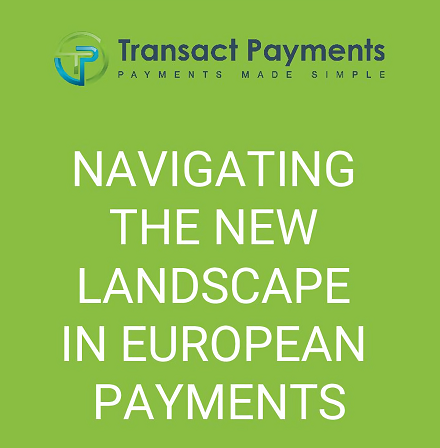
TPL predicts which markets will succeed in the evolving payments landscape
A new white paper unveils the markets which will be at the forefront of powering the payments industry in the coming years.
Released by Transact Payments Ltd (TPL), the experts in payment and card solutions, it reveals that the UK, Germany, Spain, and the Nordic countries will be the most well-positioned markets as digital transformation in the industry continues to gather pace.
TPL’s white paper comes at a time of significant change in the payments sector, presenting significant opportunities for all kinds of organisations issuing new payments products across the UK and European Economic Area (EEA).
In the last five years alone, important developments have included the advent of Open Banking legislation, the European Union’s (EU) Second Payment Services Directive (PSD2) and the impacts of Brexit and COVID-19. During this period there’s also been an unstoppable rise in digital and mobile payments, contactless cards, biometric security and wearable payment technologies.
TPL’s white paper findings
1. The UK
TPL believes Britain will retain its leadership position in payments technologies and remain an attractive market for payments issuers.
Highly developed market: The country is home to a growing (and sophisticated) market of 67 million digital-savvy consumers, backed by a forward-thinking regulator. It is also quick to adopt fast-developing payment trends, such as “soft point of sale” (POS) and mobile POS systems to enable wider acceptance for electronic payments, especially in the growing micro-merchant segment, as well as the use of QR code payments due to COVID-19.
Beyond Europe: Meanwhile, despite concerns relating to Brexit, a recent annual planning paper from the Payment Systems Regulator (PSR) suggests the UK may be about to pursue a strategy of “smart divergence” from EU legislation. This would give the UK flexibility to follow EU rules where it’s in their interests to do so, but also to diverge for commercial benefit. This could lead to opportunities for British payments firms outside Europe, including in Australia and Canada, which share similar legal systems and are exhibiting many of the same market characteristics.
2. Germany
TPL expects to see dramatic growth in corporate credit products as new specialist lenders using Open Banking, take hold in the market.
Championing PSD2: Germany has fully embraced PSD2 and created a common standard for open Application Programming Interfaces (APIs) through the Berlin Group. The country is also second only to the UK in terms of the number of permissioned intermediaries able to deliver payments services under PSD2.
SMEs: Yet historically, small and medium enterprises (SMEs) have struggled to gain access to credit and flexible banking services. However, new specialist lenders are taking hold in the market by using Open Banking to prove the creditworthiness of smaller companies.
FinTech to the fore: Thus, Germany’s relatively advanced status in PSD2 readiness is creating opportunities for partnership between banks and FinTechs via service delivery through shared APIs. Banks are now working with FinTechs such as Moss, a platform that integrates all corporate spending on one card, and Pliant, a business-to-business payments platform, to enable new payment services.
3. Spain
Similarly to Germany, TPL anticipates that credit products for SMEs are going to be huge in the Spanish market, but also for individuals.
Simplified infrastructure: Previously, Spain presented fewer opportunities for payments players given its relatively bureaucratic systems and standard debit-led card portfolios. Yet, in February 2018, Spain’s three major payment systems merged into a single infrastructure provider, SistemaPay.
Modernisation: As well as rationalising the previously complex infrastructure, Spain’s regulators have been actively engaging with the possibilities presented by PSD2 and its Open Banking mandate, including licensing Account Information Service Providers (AISPs) and Payment Information Service Providers (PISPs).
Development of credit market: With such changes taking place, much like Germany, it is realistic to expect the credit market to flourish via the digital channel, something that’s good news for both payments companies and the Spanish economy.
4. The Nordics
TPL predicts that the Nordics will be the first markets in the world to fully realise digital transformation in payments.
Digital transformation (nearly) complete? The Nordic markets of Sweden, Denmark and Norway have the highest penetration of electronic transactions anywhere in the world. The Nordics’ leadership position becomes clear – as coupled with this level of electric transactions – is a functioning, consumer-permissioned digital ID system known as BankID that makes Know Your Customer (KYC) compliance for e-commerce much easier.
National wallet schemes and “super-apps”: Since 2015, the Nordic markets have also wholeheartedly embraced digital wallet solutions. Therefore, as digital wallets rise and cards continue to be used for a very wide range of purchases, these markets will continue to seek opportunities to reduce cash use for everyday, low-value purchases such as parking, street vendors and others. This is going to create room for mPOS and soft POS systems providers, as well as multi-function card products.
How payments players can succeed
As TPL’s white paper findings highlight, success means identifying opportunities across markets, and creating products that respond to those opportunities. Yet with the payments business changing so fast, doing everything in-house is no longer an option. Those issuing payments products need to select the right partners to help them unpick the unique complexities in each of Europe’s 34 markets, from regulation to programme management.
Furthermore, flexibility – for issuers and their partners – is going to be equally important. This means offering a wide range of products to customers, products that respect the differences between markets and the specific needs of each market. “One-size-fits-all” approaches are not effective, and the signs are that such approaches will be even less effective in the future.
“We believe great opportunities lie ahead for organisations issuing payments products throughout Europe and the UK,” said Kriya Patel, Chief Executive Officer CEO, TPL. “As highlighted in our white paper, Britain, Germany, Spain and the Nordics are all in excellent positions to navigate the new landscape in the European payments sector. However, most critically of all, the evidence shows that an effective partnership is going to be the winning strategy in the years ahead.”
TPL is a licensed UK and European e-money institution, regulated by the Gibraltar Financial Services Commission, Malta Financial Services Authority and Principal Members of both Mastercard and Visa. It provides innovative and flexible UK and European BIN sponsorship, modular payment, debit, credit and prepaid services.
TPL’s white paper is available for download here.


